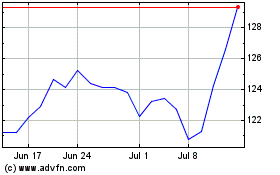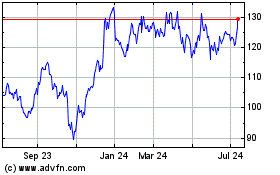Leveraged Buyouts Come Roaring Back After Coronavirus-Related Lull
October 21 2020 - 5:59AM
Dow Jones News
By Miriam Gottfried
The market for leveraged buyouts has sprung back to life after
private-equity firms finished triaging their coronavirus-stricken
portfolio companies and shifted attention back to their mounting
cash piles.
Buyout firms spent the bulk of the second quarter battened down
as they assessed the economic damage of the shutdown on the
companies they own, particularly those in hard-hit sectors such as
live entertainment, travel, retail and energy. Those in need
conserved cash, drew down revolving-credit facilities or sought
rescue financing.
That trend reversed itself in the three months ended Sept. 30 as
firms struck $146 billion of new deals globally, up from a feeble
$53.3 billion in the second quarter and $103.8 billion in the third
quarter of 2019, according to Dealogic. In the opening weeks of the
fourth quarter, $17.4 billion of buyouts have already been
announced.
Some of those were new deals, and another chunk represented the
resumption of sale processes that were put on hold when the virus
struck, according to bankers and buyout executives. Facilitating
the comeback was the return of the market for leveraged loans, the
below-investment-grade loans used to fund many buyouts, which
retreated significantly when most of the world went into
lockdown.
In August, Blackstone Group Inc. announced a deal to buy
genealogy-research company Ancestry for $4.7 billion, including
debt, from a group led by Silver Lake. Later that month
private-equity firm Clayton Dubilier & Rice LLC said it would
buy Epicor Software Corp. from KKR & Co., also for $4.7
billion, including debt.
KKR struck a deal the following month to buy 1-800 Contacts from
AEA Investors for more than $3 billion. All three of these deals
involved private-equity firms buying companies from each other, a
trend that has become increasingly common in recent years.
"There's been a definite push in sectors that were recovering
and where it felt like there was economic stability," said John
Cokinos, co-head of leveraged finance at RBC Capital Markets.
RBC co-led a financing for CD&R's $4 billion deal to buy the
construction and industrial business of HD Supply Holdings Inc.,
known as White Cap. The process had been tabled a week before the
virus hit New York City, but it was revived over the summer, Mr.
Cokinos said.
September marked the first month since February that the volume
of leveraged loans marketed to investors in the U.S. and Europe
accounted for more than half of global loan volume, Dealogic data
show. Such loans have steadily become less costly for borrowers
since the virus hit, thanks in part to a pickup in the formation of
new collateralized loan obligations -- the primary buyer for
leveraged loans.
Despite the rebound, the first nine months of 2020 have had the
lowest buyout volume since 2016, when $227.1 billion of
transactions were announced during the first nine months of the
year. And there is still plenty of uncertainty around the outcome
of the U.S. presidential election and the pace of the economic
recovery.
Firms are sitting on $2.65 trillion of cash waiting to be
invested in private markets, with nearly two-thirds of that set
aside for private-equity deals, according to data provider
Preqin.
Before the pandemic, high asset prices caused many firms to be
judicious with their deal making in hopes that a downturn would
soon offer more-favorable investment opportunities. The coronavirus
seemed as though it might offer that.
But the window of opportunity to take advantage of turmoil in
the market proved brief, thanks in large part to the Federal
Reserve. It implemented a corporate-bond-buying program that
included the debt of investment-grade companies as well as those
that had investment-grade credit ratings before March 22. That
flooded the market with liquidity, and stocks have largely
continued to charge higher ever since.
There were some firms able to seize the moment, including Silver
Lake and Apollo Global Management Inc., which put billions of
dollars to work by providing rescue financing to companies
including Airbnb Inc. and Expedia Group Inc. Others, such as
Blackstone, have preferred to mostly lie in wait with the idea that
economic recovery will prove slower than the stock market's recent
performance suggests.
For private-equity firms, which must also sell off their
investments profitably, the buoyant stock market hasn't been all
bad. Firms exited $131 billion of deals in the third quarter,
compared with $19.6 billion in the second quarter and $95.9 billion
a year earlier, according to Dealogic.
Among the biggest was Thoma Bravo LP's $11 billion deal to sell
mortgage-software company Ellie Mae Inc. to New York Stock Exchange
owner Intercontinental Exchange Inc., announced in August.
Write to Miriam Gottfried at Miriam.Gottfried@wsj.com
(END) Dow Jones Newswires
October 21, 2020 05:44 ET (09:44 GMT)
Copyright (c) 2020 Dow Jones & Company, Inc.
Blackstone (NYSE:BX)
Historical Stock Chart
From Mar 2024 to Apr 2024

Blackstone (NYSE:BX)
Historical Stock Chart
From Apr 2023 to Apr 2024
